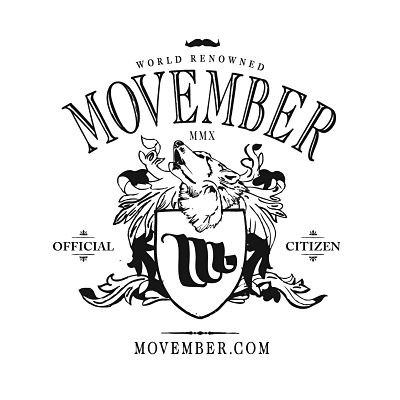 It’s November again and that is traditionally the month to grow a moustache. Yep, November becomes Movember! Movember is the word wide campaign to raise money for men’s illnesses, especially prostate cancer. The campaign started in Australia and has been running for the last seven years. It’s now a worldwide event. Prostate cancer kills one in ten men in the UK, one man dies every hour of every day- shocking figures. What makes it worse is that it is a cancer that can be treated if it’s caught early enough. The advice is to have your prostate checked every year if you are a man over fifty. If you have a history of cancer in your family then you should move this forward to your forties. So why don’t men get checked out?
It’s November again and that is traditionally the month to grow a moustache. Yep, November becomes Movember! Movember is the word wide campaign to raise money for men’s illnesses, especially prostate cancer. The campaign started in Australia and has been running for the last seven years. It’s now a worldwide event. Prostate cancer kills one in ten men in the UK, one man dies every hour of every day- shocking figures. What makes it worse is that it is a cancer that can be treated if it’s caught early enough. The advice is to have your prostate checked every year if you are a man over fifty. If you have a history of cancer in your family then you should move this forward to your forties. So why don’t men get checked out?
I’m afraid compared to women us blokes are a bit emotionally stunted. We are how we are because of the way in which we were brought up. It’s not our fault. We struggle with emotions because we were taught at an early age that men are strong, do not cry, and work through situations regardless of how we feel about things. Many of us grew up with emotionally remote fathers and had little modeling of doing anything other than “being strong”. Women are complicitous in this message and often support it covertly. This also serves a purpose in work and when times get tough. It can be a very useful behaviour when things are hard and I am not for a minute suggesting that we go around crying and acting out at the slightest provocation. It’s about getting the balance right.
So what does being emotionally limited cost us men?
- We tend to get stuck when situations with high emotions come along. Many men either go to a numb place or we express ourselves using the emotion that we have learnt is safest – i.e. anger. This can alienate us from our loved ones and get us into trouble with those around us.
- We tend to ignore worries or niggles until they have built up, so if we are feeling pain or discomfort we don’t go to the doctors and get it checked out, we store it up until we are in agony then find out we have left it too late and done ourselves serious damage. Prostate cancer is a great example of this. We ignore the early symptoms (difficulty passing urine, increased frequency of passing urine, pain when passing urine or maybe blood in the urine) and only get it checked out when we are in great pain and it’s passed into our bones too, and then we die.
- We avoid talking to others about how we feel lest they think we are weak. Our problems mount up and we think that the only way out is to kill ourselves. Men are four times more likely to commit suicide than women in the UK (figures from the office for national statistics).
How can we put the situation right?
There is no doubt that working with a good counsellor is a great way of restoring the balance. Counsellors come in all shapes and sizes and you will find some male therapists that ooze emotions and some women therapists that are very “thinking” in the way they do things. Go meet a few and make your decision based on who you feel comfortable with. You can also do things without the support of a counsellor. Here are three suggestions:
- The first step is getting in touch with how you feel. This could be achieved by just sitting and giving yourself time to feel your feelings instead of rushing around all the time.
- Secondly, start talking to those closest to you about what’s going on for you. You might begin this process by doing the easy stuff in general conversation. What are you enjoying in your life? What’s really pissing you off? Are you feeling sad about anything? This is a great way to bond with your loved ones as it invites closeness and intimacy.
- Thirdly, as you open up, start expressing the stronger emotions you are feeling at the time you are feeling them rather than storing them up. Action/feeling statements are great for this “When you (their behaviour) I feel (your feeling) so in future I would like you to (corrected behaviour). Keep it focused on behaviour and don’t let it slip into criticism. Your emotion has been expressed and the other person knows what you want. A much better solution than getting very angry and doing damage either emotionally or physically.
I guess our ultimate goal is to feel our emotions so we can be in tune with those around us and make strong connections. We can also teach our sons and daughters that being a powerful man is not just about physical strength, but also involves the ability to connect with others, have empathy and access to the whole spectrum of emotions.
Read the book: Emotional Literacy: Intelligence with a Heart by Claude Steiner. This man is a great role model on what it means to be a man. He spent many years being the “tough guy” and explains in the book what this cost him and how he changed – it’s a classic so click on the link and get it read!

